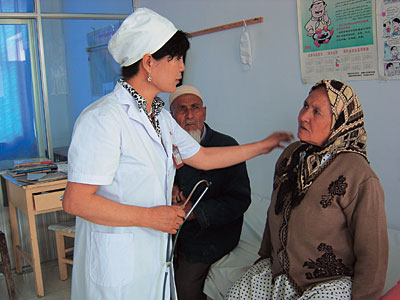|

Liu Yulian, Han
In 1966, Liu Yulian, then 17 years old, arrived from Gansu with her father to settle in Erpu, a village of the Kumul (Hami) Prefecture where the population is 98 percent Uyghur.
She had no intellectual luggage except her middle school diploma. On her arrival, the local government chose her because of her instruction – a valid level at that time – to work at the local medical station. She knew nothing about medicine and was sent in June 1971 to take a three-month course in an army hospital. Famous medical officers taught her acupuncture, she remembered. In the evenings, the young woman practiced inserting needles on herself. Returning to the village, she heard about an arthritic man who had tried all kinds of treatments without any results. Liu offered to try acupuncture on him. With nothing to lose, he agreed, and the results were positive.
One day, Liu visited an old lady suffering from a very bad headache. In fact, the patient had a fever of 40.4 degrees. It would have been better to go to the hospital, but the patient protested because she couldn't afford it. Liu Yulian sought a solution in books and found that aspirin could help. The fever dropped and the patient needed no other treatment.
How could Erpu people not like Liu Yulian? Her name soon became "Yatou," which means "the girl." First, because the patient cured by her good care ceaselessly praised the Yatou's merits and also because her Chinese name was difficult to remember for the Uyghurs, who preferred to call her simply "the girl."
When she started to work, Liu saw and understood the misery of the village inhabitants and decided to do something for them. It didn't take long to appreciate her kindness and her soft character. The biggest obstacle was verbal communication. The population is almost completely Uyghur and Liu is Han. Even today the village counts 1,079 inhabitants among 320 households, including only five Han households.
This difficulty did not deter Liu, who started to ardently study the language – oral and written. Today, she understands and speaks Uyghur just like the local population, and can read and write what is necessary for her work, albeit slowly.
Liu Yulian has kept a strong Gansu accent. Why did she come from Gansu to Xinjiang? "The 'cultural revolution' had started. My father was about to be made an object of criticism, so my uncle who worked with the railways said to him: 'Come with me to Hami.' My father asked me whether I wanted to accompany him. Once here, we came to realize that he would no longer be publicly criticized. I thought he would go back to Lanzhou, but he said: 'We are fine here, and Xinjiang is also China. So, I'll remain.' My mother came later."
Why not rather help the poor of Gansu? I asked the self-educated "doctor." The 100,000 Chinese who came from the whole country in 1954 within the framework of the Production & Construction Corps to help Xinjiang develop settled in their new homeland and assimilated into the population. Very few left, and a great many of those who did regretted doing so after a while and returned: they had from then on new roots.
A village doctor earned between 20 to 30 yuan a month. It was an appreciable income at that time. But who would have said that more than 40 years later, Liu Yulian's monthly allowance would still be only 350 yuan? Liu has no insurance, no retirement funds. Her colleague is a graduate nurse who earns reasonable wages. Each village has at least one medical station, and it is compulsory that two people are on hand. Liu harbored no jealousy but she noticed the inequity. Not only did she not complain, she said she was very happy. She liked her work and especially the people to whom she has dedicated her life.
No holidays, festive days, or weekends for Liu. In the evening, she read and studied medicine. Through the years, she took other training courses and exams. She watched little TV because, she said, due to aging, her sight has declined. However, she did not wear glasses. Is it vanity? Liu is a very beautiful woman who didn't show her age; she wore a row of pearls and earrings with her white uniform. Questioned about her own health, she answered that she felt pain in her renal area and arthritis in her knees; would this be the consequence of her high heels? She ate little and irregularly, she admitted, which might have been the cause of her stomach problems. However, she did not look after herself nor would she consult specialists.
For four decades, Liu has devoted herself to her patients. "She doesn't know the difference between day and night when it comes to service," said Wu Zhengyi, her husband. Patients who have no money? She doesn't care. It is free for the poor. A "thank you" is enough for Liu, and the fact that people rely on her fills her heart with satisfaction. Even more, she has already spent 35,000 yuan on her patients and 6,000 to help needy students pursue their studies.
Without a diploma in medicine, Liu Yulian is not authorized to perform all the medical procedures. However, could she specialize in gynaecology, geriatrics, and pediatry at the same time? When a case exceeds her abilities, she sends the patient to consult at Hami Hospital.
"Do you practice preventive medicine?" I asked. She did not seem to understand my question. I specified that health starts with personal hygiene.
"Yes," she said, "I tell people to take care of cleanliness."
|
